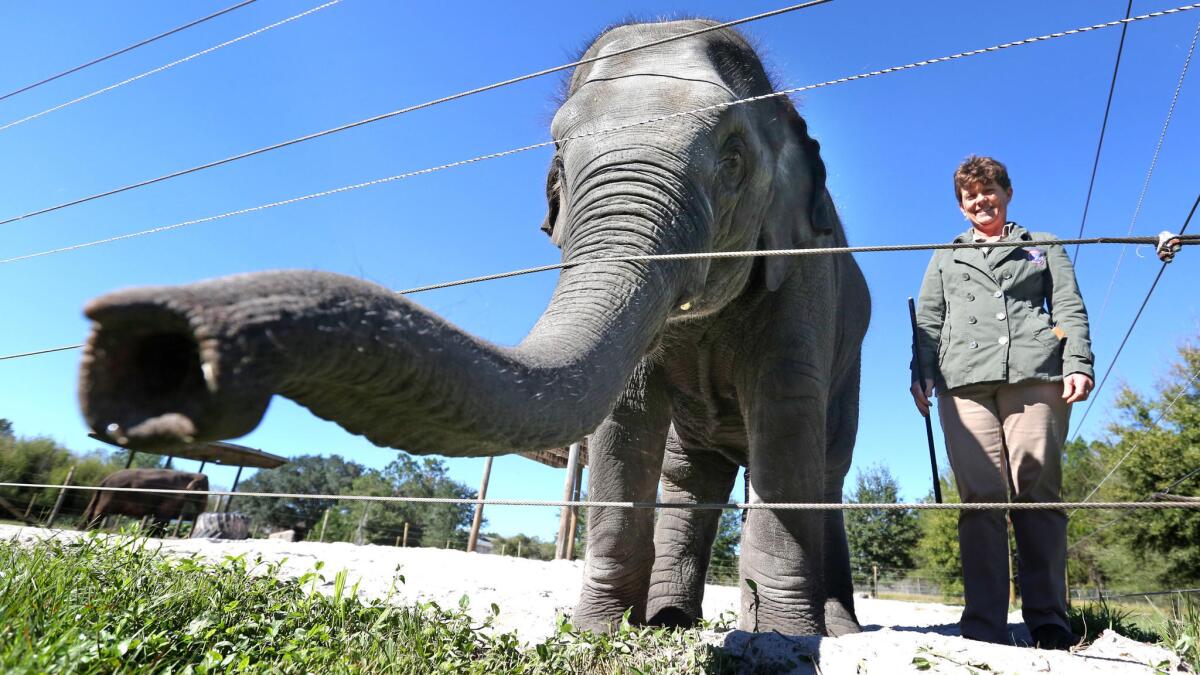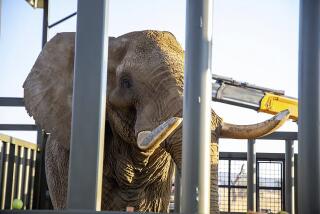Ringling Bros. circus to end its elephant acts this spring after more than a century in the show

Mike, a 2-year-old Asian elephant bull, with his handler Trudy Williams, greets visitors during a media tour of the 200-acre Center for Elephant Conservation in Polk City, Fla. The Ringling Bros. and Barnum & Bailey Circus is ending its elephant acts a year and a half early, and will retire all of its touring elephants in May.
- Share via
Reporting from ST. PETERSBURG, FLA. — The Ringling Bros. and Barnum & Bailey Circus is ending its elephant acts a year and a half early, and will retire all of its touring elephants in May.
The move comes amid increasing scrutiny of circus elephant acts, with local governments passing “anti-circus” and “anti-elephant” ordinances in response to concerns over animal cruelty.
The circus’s parent company, Feld Entertainment, told the Associated Press that all of the iconic elephants will be permanently retired to the company’s 200-acre Center for Elephant Conservation in central Florida. There are 11 elephants on tour with the circus.
“They’ll be joining the rest of the herd,” said Alana Feld, Ringling’s executive vice president and show producer, who is also part of the family that owns Feld Entertainment. Feld owns the largest herd of Asian elephants in North America. In addition to those still touring, there are 29 elephants on the property now, and two additional animals are on breeding loans to zoos, Feld said.
See more of our top stories on Facebook >>
It costs about $65,000 yearly to care for each elephant, she said, and the company had to build new structures to house the retiring elephants at the center, located between Orlando and Tampa.
Last year, Feld Entertainment announced that the elephants would be phased out and eventually retired by 2018. Once the company began planning, it realized it could retire the elephants a lot sooner, Feld said.
Elephant acts have been showcased by Ringling for more than a century and have often been featured on its posters.
But because so many cities and counties have passed “anti-circus” and “anti-elephant” ordinances, it became difficult to organize tours of three traveling circuses to 115 cities each year, Feld Entertainment CEO Kenneth Feld said last year. Fighting legislation in each jurisdiction is expensive, he said.
Los Angeles and Oakland prohibited the use of bull-hooks by elephant trainers and handlers in April. The city of Asheville, N.C., also nixed wild or exotic animals from performing in the municipally owned, 7,600-seat U.S. Cellular Center.
Ringling’s new show will begin in July without the giant pachyderms.
“We’re looking at a lot of new ways of doing things,” Feld said.
She said the retired elephants at the Center for Elephant Conservation will also be part of cancer research.
NEWSLETTER: Get the day’s top headlines from Times Editor Davan Maharaj >>
Cancer is much less common in elephants than in humans, even though the big animals’ bodies have many more cells. That’s a paradox known among scientists, and now researchers think they may have an explanation — one they say might someday lead to new ways to protect people from cancer.
Compared with just one copy in humans, elephants’ cells contain 20 copies of a major cancer-suppressing gene, two teams of scientists reported in October. The gene helps damaged cells repair themselves or self-destruct when exposed to cancer-causing substances.
The findings aren’t proof that those extra p53 genes make elephants cancer-resistant, but if future research confirms it, scientists could try to develop drugs for humans that would mimic the effect.
Dr. Joshua Schiffman, a pediatric cancer specialist at the University of Utah, is one of the researchers trying to find clues in the blood samples of some of the Ringling elephants.
“There’s so much to be learned from their DNA,” Feld said.
Animal rights activists have long alleged that circuses have mistreated elephants.
In 2014, Feld Entertainment won $25.2 million in settlements from a number of animal-rights groups, including the Humane Society of the United States, ending a 14-year legal battle over allegations that Ringling circus employees mistreated elephants.
Elephants have been a symbol of the Ringling circus for decades. P.T. Barnum brought an Asian elephant named Jumbo to America in 1882.
Tamara Lush writes for the Associated Press.
ALSO
California is becoming a battleground state in the fight over health insurance mega-mergers
First glimpse of Disneyland riverfront post Star Wars Land
Resident ‘stars’ take a walk down memory lane at ‘History of Beverly Hills’ premiere
More to Read
Sign up for Essential California
The most important California stories and recommendations in your inbox every morning.
You may occasionally receive promotional content from the Los Angeles Times.










